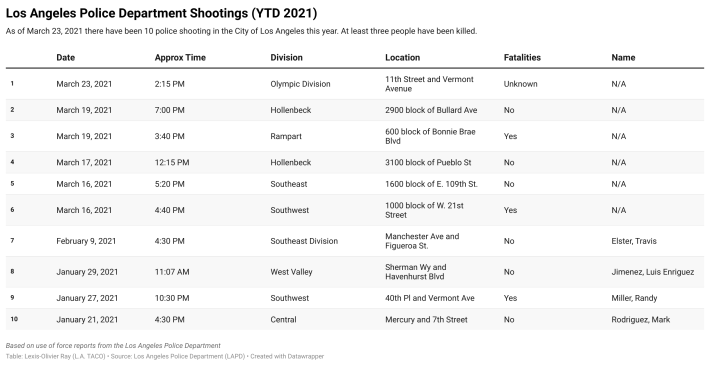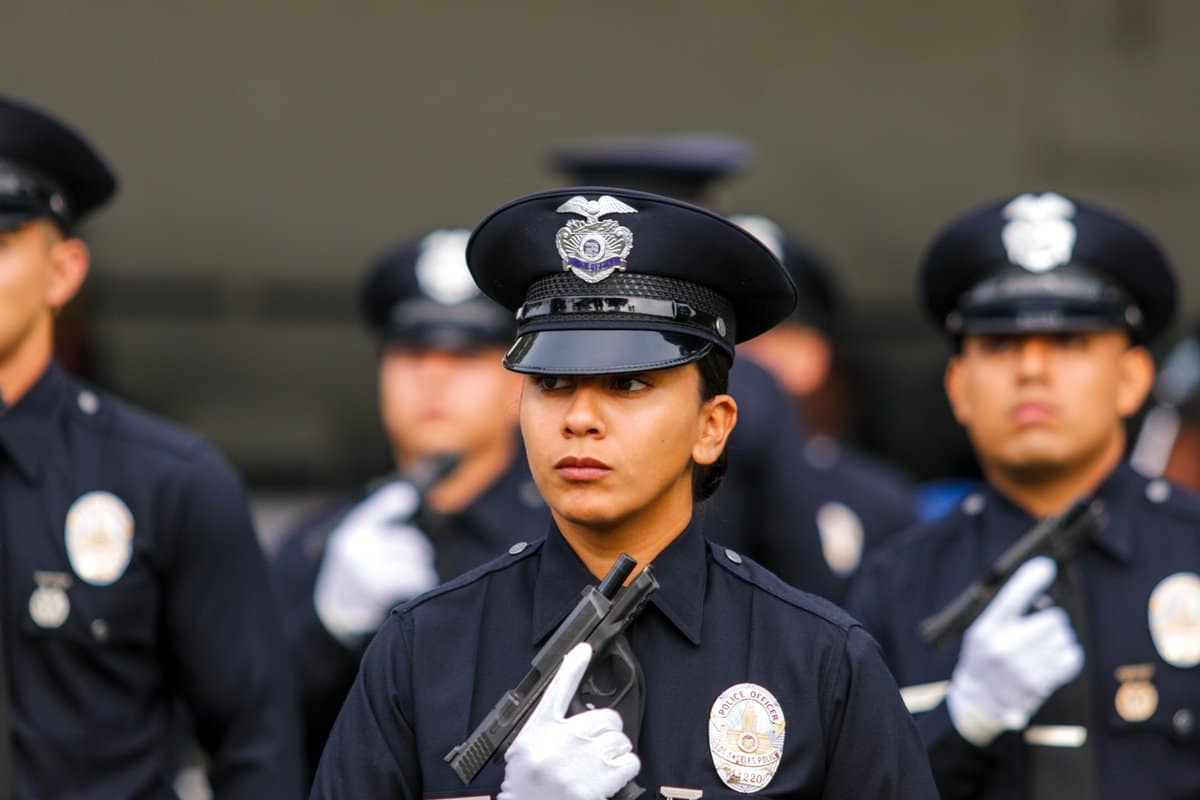[dropcap size=big]I[/dropcap]n seven days, Los Angeles Police Department (LAPD) officers fired their guns at people six times. The unprecedented number of police shootings in Los Angeles—a city that averaged roughly one police shooting every two weeks last year—comes at a time when the country is already dealing with the aftermath of two tragic mass-shootings, and locally, Angelenos are seeing a rise in violent crime.
Last Tuesday, two people were shot by Los Angeles police officers in South L.A., less than two hours apart, and an LAPD SWAT officer was reportedly shot twice during a stand-off with a barricaded man reportedly suffering from a mental health crisis.
A third shooting occurred less than a day later when an off-duty Los Angeles police officer reportedly observed a drive-by shooting. “As the suspects drove in the officer's direction, an Officer-Involved Shooting occurred,” the department said in a written statement last week. LAPD policy generally prohibits officers from shooting at or from moving vehicles “unless a person in the vehicle is immediately threatening the officer or another person with deadly force by means other than the vehicle.”
Last Friday, two men were shot a few hours apart, during a chaotic afternoon when the department was also responding to two major vehicle collisions, including one that sent a TV news reporter and photographer to the hospital with injuries. The first police shooting involving a man reportedly armed with a hammer and a piece of metal occurred near MacArthur Park and resulted in a fatality. A few hours later, an incident that began as a traffic stop ultimately resulted in a man being shot by police after reportedly crashing into a house in El Sereno during a brief car chase.
And most recently, yesterday, a man was reportedly shot near the front door of the Olympic Division LAPD Station on Vermont Blvd and 11th Street on the border of Koreatown and Pico Union.
Last weekend and again on Tuesday, the LAPD was criticized on Twitter for describing the incidents as “officer involved shootings.” ‘Copaganda’ for saying: “we shot at someone or someone shot at us.”
“How was the officer involved?” Dozens of Twitter users responded to announcements made by the department on social media. The LAPD was also criticized for deleting a Tweet, following Friday’s fatal shooting.
How was the officer involved @LAPDHQ? https://t.co/7qlP1Wz8PK pic.twitter.com/iTuoFBYX1H
— People's City Council - Los Angeles (@PplsCityCouncil) March 24, 2021
A day after two people were shot by LAPD officers, the department released a statement that offered a brief summary of the five shootings last week, an occurrence that they described as “highly unusual.”
An L.A. TACO review of LAPD use-of-force records from last year found that in October the LAPD was involved in four shootings in a four day period between Oct. 15 and Oct. 18. And in May, two days after George Floyd was killed, Los Angeles police were involved in five shootings in a seven day period. In total, the LAPD was involved in 27 shootings last year when police shootings hit a 30 year low.
On Tuesday morning, before a sixth shooting occurred, Los Angeles Police Chief Michel Moore described last week's events as “shocking” during a weekly Los Angeles Police Commission meeting.
To date at least three people have been killed by the Los Angeles Police Department this year and as of Tuesday, officers have fired their weapons at people on 10 occasions according to the LAPD. More than half of the those incidents happened in the past seven days.
On Tuesday morning, Chief Moore and the Los Angeles Police Commission — the civilian oversight board of the LAPD — heard from family members of Daniel Hernandez Bravo, a 28 year old man that was killed by Los Angeles police last year. Bravo was fatally shot roughly a mile away from where another Daniel Hernandez was killed days earlier by an LAPD officer that also moonlights as a model and competitive shooter.
During the meeting, the police commission provided 8 minutes for family members to speak to the board virtually via Zoom. For many listeners, hearing from the family painfully illustrated the long lasting trauma and suffering that families go through when they lose loved ones to police violence. In a trembling voice, Bravo’s sister Perla Hernandez, told the board of police commissioners and Chief Moore: “As a Latino person, there's always that fear that the police are going to harm you. And I think that it hurts the most to know that [Bravo] had that fear. And for him to end up dead by the police, it really hurts because it makes me think if I'm afraid of the police, will I maybe be the one dead one day, and it's scary. I know it's scary for my siblings and for other Hispanic children to see that happen day-to-day.”








